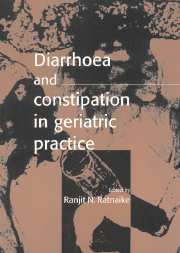Book contents
- Frontmatter
- Contents
- List of contributors
- Preface
- Acknowledgments
- Foreword by Gary R. Andrews
- I Defences of the aging gastrointestinal tract
- II Diarrhoea
- 3 Pathophysiology of diarrhoea
- 4 History and physical examination
- 5 The investigation of diarrhoea
- 6 Faecal incontinence
- 7 Drug-induced diarrhoea
- 8 Aetiology of infectious diarrhoea
- 9 Specific infectious conditions
- 10 An overview of management of infectious diarrhoea
- III Noninfectious clinical entities
- IV Constipation
- V Perspectives of altered bowel function
- Index
4 - History and physical examination
Published online by Cambridge University Press: 17 August 2009
- Frontmatter
- Contents
- List of contributors
- Preface
- Acknowledgments
- Foreword by Gary R. Andrews
- I Defences of the aging gastrointestinal tract
- II Diarrhoea
- 3 Pathophysiology of diarrhoea
- 4 History and physical examination
- 5 The investigation of diarrhoea
- 6 Faecal incontinence
- 7 Drug-induced diarrhoea
- 8 Aetiology of infectious diarrhoea
- 9 Specific infectious conditions
- 10 An overview of management of infectious diarrhoea
- III Noninfectious clinical entities
- IV Constipation
- V Perspectives of altered bowel function
- Index
Summary
Introduction
A well taken history and careful physical examination provide substantial information to establish a working diagnosis. History taking from an elderly patient is more difficult as compared with younger adult patients. A thorough medical evaluation is complicated and time consuming in the elderly patient who has a longer history of illness and many associated medical problems.
At the initial stage of the clinical interview there is much to be gained by establishing:
the patient's normal bowel habit
what is meant by diarrhoea
whether the problem is spurious (overflow) diarrhoea due to constipation
whether there is faecal incontinence.
Clinicians are aware that history taking is an art and not a science, and obtaining a comprehensive history is what distinguishes the competent clinician. A poor historian is more often the physician and not the patient. In the elderly history taking is more tedious and may tax the physician's patience. The dulling of memory and the propensity in old age to remember distant past events with greater clarity than recent events may pose problems. More important events, in the view of the elderly patient, have occupied the forefront of the memory stores and crowded out the less important. The recall of names and dosages of medication important to the physician may be burdensome to the patient.
In taking a history from an elderly patient, changes in style and tempo are necessary. The medical interview may be tiring to the elderly patient.
- Type
- Chapter
- Information
- Diarrhoea and Constipation in Geriatric Practice , pp. 31 - 39Publisher: Cambridge University PressPrint publication year: 1999



